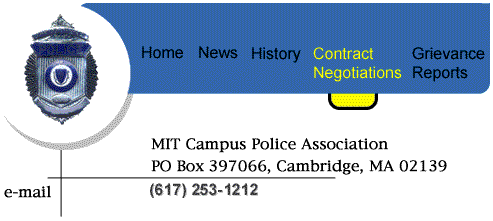

The acronym MIT is synonymous world wide with superlative education. The subsidiary role of the Campus Police force within MIT's high powered educational milieu is to maintain a safe learning and living environment for students. But are you aware that this same institution which is so committed to quality education does not believe that educational achievement is a goal worth pursuit by Campus Police officers? That's what the MIT Campus Police Association was told by MIT during the current round of contract negotiations. In response to the Association's proposal for an annual educational incentive, designed to encourage pursuit of degrees by campus police officers and to reward those who have already obtained them, MIT has stated point blank that it does not see any value in such educational achievement. If MIT truly believes what it is saying at the bargaining table, it is sadly mistaken.
Most police experts agree that keeping the peace in today's troubled society requires that traditional law enforcement techniques yield in part to new strategies such as community policing and problem solving policing. These new strategies require police officers to better weave themselves into the fabric of the community they patrol in an effort to address crime and related quality of life issues. In effect, officers seek to forge a partnership with the community as a means of preventing crime rather than merely responding to crime by arrest and prosecution. Given the new focus of policing, and the important role that observation, assessment and communication skills will play in this focus, the value of a well educated police force is too painfully obvious to have been missed by MIT.
Even if MIT cannot comprehend the value of an educated police force by itself, it only need read the standards of the Massachusetts Police Accreditation Commission for guidance. At Section 22.2.8 of those standards, it is plainly noted that "(B)ecause the value of employees to the organization is enhanced by their continuing education, the agency should encourage and facilitate their pursuit of higher education and provide whatever tangible benefits it can to them for academic achievement." We assume that MIT has the accreditation standards available since it routinely quotes from them in selected circumstances. If it doesn't have them, it can borrow a set from neighboring Harvard University, which obviously does have a copy since it provides its officers with education pay in ascending amounts for each greater level of educational achievement.
If you disagree with MIT's lack of commitment to educational achievement by its police officers, or otherwise wish to support efforts by the MIT Campus Police Association to gain fairness in the workplace, please let one of the following MIT officials know.
Charles M. Vest
President
(617) 243-0148
cmvest@mit.eduJohn R. Curry
Executive Vice-President
(617) 253-1882
jcurry@mit.eduRobert J. Lewis
Director of Personnel
Employee Relations
(617) 253-4078
rlewis@mit.eduAnn Glavin
Chief, MIT Police
(617) 253-1212
aprg@mit.eduAs a public service to the MIT Community, the Association has attached to this update a statement of rights for employees of MIT who believe they are not being fairly paid because of their sex.
| Home | News | History | Contract Negotiations | Grievance Reports | E-mail |
All information is trademark and copyright 1999 MITCPA.